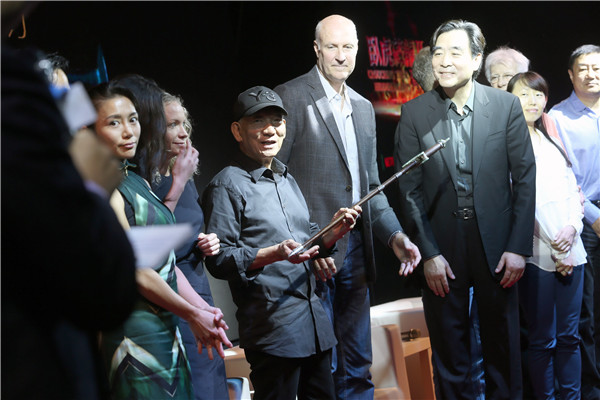
Oscar-winning Crouching Tiger, Hidden Dragon took audiences by storm when it was released 15 years ago.
Now, 15 years after Ang Lee's international hit won four prizes at the 73th Academy Awards, the impressive Chinese wuxia (martial arts) title has a sequel being made by The Weinstein Company.
But it won't be Lee at the helm.
Kung fu enthusiasts will, however, be delighted to know that Hong Kong veteran filmmaker Yuen Woo-ping is the director of the latest title, since Lee showed no interest in repeating a similar story.
"Filmmaking is part of life. I'll do it whenever I still can do it. But for me, Crouching Tiger, Hidden Dragon has become the past," Lee said at the 2013 Cannes Film Festival.
Details of the sequel were shared on Monday in Beijing, reportedly from a place not far from the new film's sets.
Crouching Tiger, Hidden Dragon II: The Green Legend will hit mainland theaters on Feb 8, 2016, during the Chinese Lunar New Year.
The Chinese premiere date is one week before its North America release. It is scheduled to simultaneously open in IMAX cinemas and on Netflix for online screening.
Industry sources say that the sequel may find it difficult to surpass the milestone first installment.
For the record, Crouching Tiger, Hidden Dragon, which cost $17 million, is one of the highest-earning foreign language movies in North America. It earned $128 million in the United States and grossed $213 million around the world.
Alongside commercial success, it received high praise from critics.
While earlier reports said that investors had reached out to Ohio University-educated Ronny Yu to make the sequel, the Legacy of Rage's director is believed to have refused, worrying that it would be too hard to match the success of the first film.
But Yuen seems up to the challenge and has impressive credentials and backers.
"Yuen's beautiful action scenes have influenced a lot of our filmmakers ... and some top Hollywood directors are his huge fans ..." Tom Prince, the executive vice-president of physical production with Weinstein, tells China Daily.
"For any American filmmaker who wants to display martial arts choreography in their action titles, the first person who comes to mind is usually Yuen," he says, adding that one of the company's co-founders, Harvey Weinstein, is a big fan of Asian cinema.
Yuen is among the earliest Hong Kong filmmakers to garner popularity in the West, and Hollywood's Quentin Tarantino and the Wachowskis are said to be among his fans.
He was recruited as an action director for the blockbuster franchises Kill Bill and The Matrix.
The stylized fights designed by Yuen have won him the unofficial title of "No 1 action choreographer" of Chinese-language films in showbiz circles. He was also in charge of the action choreography of Lee's blockbuster.
Yuen, 70, tells China Daily that the sequel aims to explore a new way to make Chinese wuxia films, with a mix of Western and oriental flavors.
"I participated in Lee's Crouching from the beginning to the end. It's a master's work, but I accept the (new) challenge," he says.
"We've injected something new in the emotional scenes and have invented something fresh for the fights."
There are also changes to the cast.
Despite Chinese-Malaysian actress Michelle Yeoh reprising her role as the swordswoman Yu Xiulian, other characters have changes, such as the American-Chinese kung fu star Donnie Yen.
The sequel, adapted from one of Chinese wuxia writer Wang Dulu's Crane-Iron Pentalogy, centers on the thrilling adventures involving an ancient sword called The Green Destiny (the main focus of the first installment).
An evil swordsman exiled by a famed martial arts group from the Wudang Mountain area plots to rob the precious weapon.
The roles played by Yeoh and Yen (the protagonist Yu's fiance in the movie) risk their lives to stop the evil swordsman.
Interestingly, "destiny" seems to hang over the filmmaking process.
Bey Logan, the movie's producer, says that the crew encountered Lee during their time at New Zealand director Peter Jackson's facility in Auckland, where 95 percent of the film's picturesque scenes were shot.
The sequel also used The Lord of the Rings' special effects team of the New Zealand director.
"Lee gave me the advice to 'have fun with the filmmaking'... It's like destiny to meet him by accident ... Every time when we have some big problems, I go back to Lee's suggestion," he says, smiling.
Logan says that one of the biggest challenges was how to tell a Chinese story and get it to be easily accepted by Western audiences.
"While you'll find the action scenes in Chinese martial arts movies amazing, sometimes it's hard for Americans to get the motivations of the characters," he says.
"So we had (American screenwriter) John Fusco write the script. He has a terrific understanding of Chinese culture."
Fusco (Young Guns) is believed to be writing another Weinstein Chinese-themed screenplay featuring Marco Polo, the famed Italian merchant traveler who introduced China to Europe.
The Weinstein Company, though not as famed as Hollywood's "big six", has been an Oscar favorite in the past decade.
To date, the American independent film studio founded by Bob and Harvey Weinstein has earned 69 Academy Awards and around 250 Oscar nominations, including the 2011 Oscar-winning The King's Speech.
Alongside Weinstein, the big-budget sequel's producers include China Film Group, Beijing-based Pegasus Media and Netflix, which aims to use its global platform to target the sequel at its 60 million registered users.
So, will the sequel touch a chord with mainland viewers?
Sun Jianjun, president of Pegasus, says that the script was revised around 10 times over nearly seven years.
A Chinese scriptwriter assisted Fusco in making the tale more "natural" to the Chinese.





